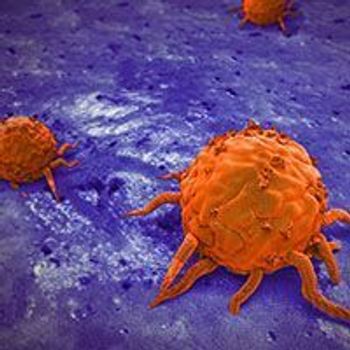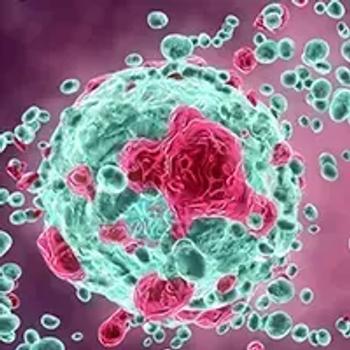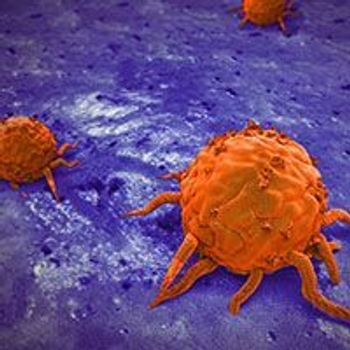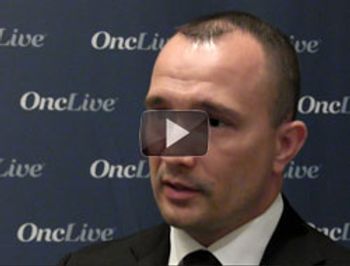
Bassel El-Rayes, MD, discusses the efficacy of tidutamab in advanced neuroendocrine tumors.

Your AI-Trained Oncology Knowledge Connection!


Bassel El-Rayes, MD, discusses the efficacy of tidutamab in advanced neuroendocrine tumors.

Pamela Kunz, MD, discusses the importance of tailoring treatments to individual patients with neuroendocrine tumors.

Daneng Li, MD, discusses the interim analysis results of a phase 1 trial evaluating surufatinib in United States patients with neuroendocrine tumors.

Diane Reidy-Lagunes, MD, discusses the results of the phase 3 SPINET trial by tumor subtype in bronchopulmonary neuroendocrine tumors.

Nitya Raj, MD, discusses the results of a phase 4 trial comparing injection site pain with octreotide long-acting release vs lanreotide in well-differentiated neuroendocrine tumors.

Daniel M. Halperin, MD, discusses the efficacy and safety results of the phase 1/2a Protocol PEN-221-001 trial in advanced gastrointestinal mid-gut neuroendocrine tumors.

Surufatinib demonstrated a comparable health-related quality of life with placebo in patients with advanced neuroendocrine tumors.

Tidutamab was found to be well tolerated with a best overall response of stable disease in patients with advanced, well-differentiated neuroendocrine tumors of pancreatic, gastrointestinal, lung and undetermined origin.

The combination of pembrolizumab (Keytruda) and irinotecan- or paclitaxel-based chemotherapy was not found to be effective in pretreated, biomarker-unselected patients with extrapulmonary poorly differentiated neuroendocrine carcinomas.

Patients with carcinoid syndrome reported improved symptoms following treatment with telotristat ethyl.

Prophylactic octreotide can be safely discontinued in patients with neuroendocrine tumors undergoing operation, as stopping its use has not been shown to increase the rate or duration of carcinoid crisis.

The combination of surufatinib and toripalimab demonstrated promising clinical activity with a manageable safety profile when used as second-line treatment for patients with advanced neuroendocrine carcinoma.

Surufatinib demonstrated strong antitumor activity along with a manageable safety profile in heavily treated US patients with progressive extrapancreatic neuroendocrine tumors or pancreatic NETs, according to interim phase 1 data.

Lanreotide autogel/depot administered at 120 mg every 28 days may be an appropriate treatment for patients with advanced bronchopulmonary neuroendocrine tumors.

The small molecule drug conjugate PEN-221 was generally well tolerated and elicited significant clinical benefit in patients with pretreated gastrointestinal neuroendocrine tumors.

XmAb18087 demonstrated a disease control rate of 43% across dose levels in patients with neuroendocrine tumors and a favorable safety profile.

The novel somatostatin analog for the Targeted Alpha-emitter Therapy 212Pb-DOTAMTATE has demonstrated early efficacy and a tolerable safety profile in a small cohort of patients with metastatic somatostatin receptor–expressing neuroendocrine tumors irrespective of location of the primary tumor.

Aman Chauhan, MD, a medical oncologist at the University of Kentucky, discusses key recent advances in therapeutics for patients with neuroendocrine tumors, and points to the future with ongoing combination studies.

Increasing the dosage of lanreotide autogel from every 28 days to every 14 days led to encouraging progression-free survival outcomes in patients with progressive pancreatic and midgut neuroendocrine tumors.

Jonathan Strosberg, MD, discusses retreatment with Lutathera in advanced neuroendocrine tumors.

Aman Chauhan, MD, a medical oncologist at the University of Kentucky, discusses the role of Lutathera in neuroendocrine tumors.

Combination CDK4/6 and MEK inhibition was “highly synergistic” in killing pancreatic neuroendocrine tumor cells in vitro and effectively suppressed PNET growth in mice.

Marianne Pavel, MD, discusses the progression-free survival of patients with pancreatic and midgut neuroendocrine tumors who are treated with lanreotide autogel in the phase 2 CLARINET FORTE trial.

Retreatment with Lutathera-based peptide receptor radionuclide therapy has been shown to have an encouraging survival benefit with an acceptable safety in patients with neuroendocrine tumors.

Edward Wolin, MD, discusses the safety profile of 177Lu-dotatate in patients with advanced neuroendocrine tumors.

Investigators are evaluating the combination of telotristat ethyl and Lutathera with a goal to improve progression-free survival in patients with well-differentiated neuroendocrine tumors in a randomized, phase 2 study that was highlighted during the 2020 NANETs Virtual Symposium.

Longer-term data demonstrated that treatment with the radiopharmaceutical Lutathera continued to show low rates of toxicity among patients with somatostatin receptor–positive neuroendocrine tumors.

Geoffrey Krampitz, MD, Department of Stem Cell Biology and Regenerative Medicine, Stanford School of Medicine, identifies tumorigenic cells and therapeutic targets in patients with pancreatic neuroendocrine tumors.

Pamela L. Kunz, MD, assistant professor of Medicine (Oncology), Stanford University School of Medicine, discusses the potential of immunotherapy in the treatment of patients with neuroendocrine tumors (NETs).

Everolimus improved progression-free survival by 7.1 months compared with placebo in patients with lung/gastrointestinal (GI) neuroendocrine tumors, representing a 52% reduction in the risk of progression or death.